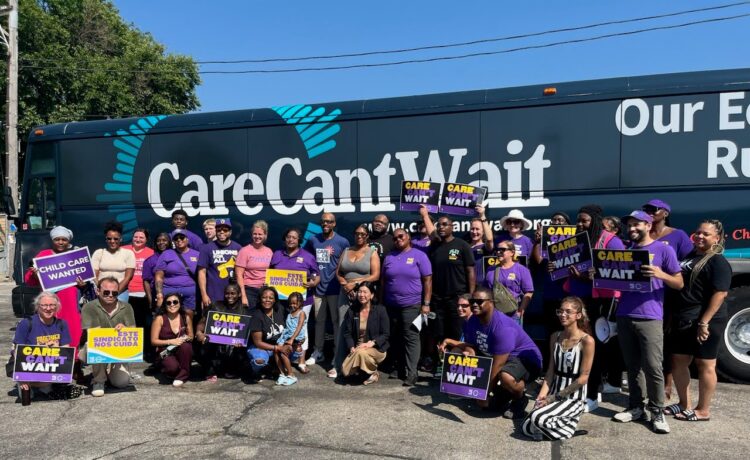A campaign to elevate the importance of caregiving to the U.S. economy kicked off Monday with a stop in Wisconsin, aiming to throw the weight of care providers and the families who depend on them into the fall elections.
Groups in the Care Can’t Wait coalition and campaign are highlighting the high cost of care — whether child care or care for people who are aging or who have disabilities — as well as the lack of paid leave for workers who are sick or who need to provide care for family members.
“Every day, families struggle with care — whether it’s child care, paid leave, or home care,” said Corrine Hendrickson, a New Glarus child care provider, at an afternoon rally in Milwaukee. The campaign, she said, aims “to inspire action and call for transformative investment in our nation’s care system.”
The campaign is led by Caring Across Generations, a nonprofit advocacy group, and is a joint project with several other groups focused on health care, child care, family leave and related issues. It also includes the Service Employees International Union (SEIU), among whose members are long-term care health workers and, in some states, child care workers and home health workers.
“We have a crisis in our care economy,” Louis Davis, executive director of SEIU Wisconsin, told the Wisconsin Examiner Monday. “You can talk to anyone up and down the spectrum of the life cycle: Whether you’re having a child that you’re trying to find affordable child care, you have a parent that you’re trying to get care for that’s aging or you have a loved one who has a disability, finding quality care regardless of where you are on the spectrum of the issue.”
Milwaukee was the second stop on the campaign’s bus tour that launched in Chicago Monday morning. Stops are planned Tuesday in Michigan and later this week in Pennsylvania, New York, North Carolina and Georgia.
Advocates in early education and health care have been calling attention to the need for care and for ways to better support caregivers for several years, particularly in child care and long-term health care. Now they’ve brought together those varied kinds of care into a single concept: the care economy.
“Care is its own economy,” Hendrickson told the Wisconsin Examiner Monday. “Without care, we don’t have an economy.”
The child care system is struggling under a paradox: Quality care is too costly for parents, Hendrickson said, while what parents can afford won’t sustain livable wages for high quality caregivers.
Long-term state and federal investment are needed to bridge the gap between what families can afford and the pay needed to maintain and build the caregiver workforce, such as restoring the Child Care Counts program that bolstered child care providers during the COVID-19 pandemic, she said.
Davis said Care Can’t Wait is a “very strategic and deliberate [campaign] to make the connection between political outcomes and investment into the care economy.” That includes looking to Wisconsin’s 2025-27 budget but also elections for the Legislature, Congress and the White House in November.
SEIU was the first union to endorse Vice President Kamala Harris for the Democratic presidential nomination when President Joe Biden stepped away from seeking a second term.
“We believe [her election] is the best chance for care workers to have a strong investment and policy agenda that will be advanced through the White House,” Davis said, while a prospective Trump administration would make that “near impossible [and] will actually be regressive to the care economy.”
With Harris and her running mate, Minnesota Gov. Tim Walz, now officially nominated, “our first priority is to make sure that they win,” Davis said. “But as we do that we have a responsibility to push even our allies to prioritize the investment into the care economy in their policy agendas.”
GET THE MORNING HEADLINES DELIVERED TO YOUR INBOX
















